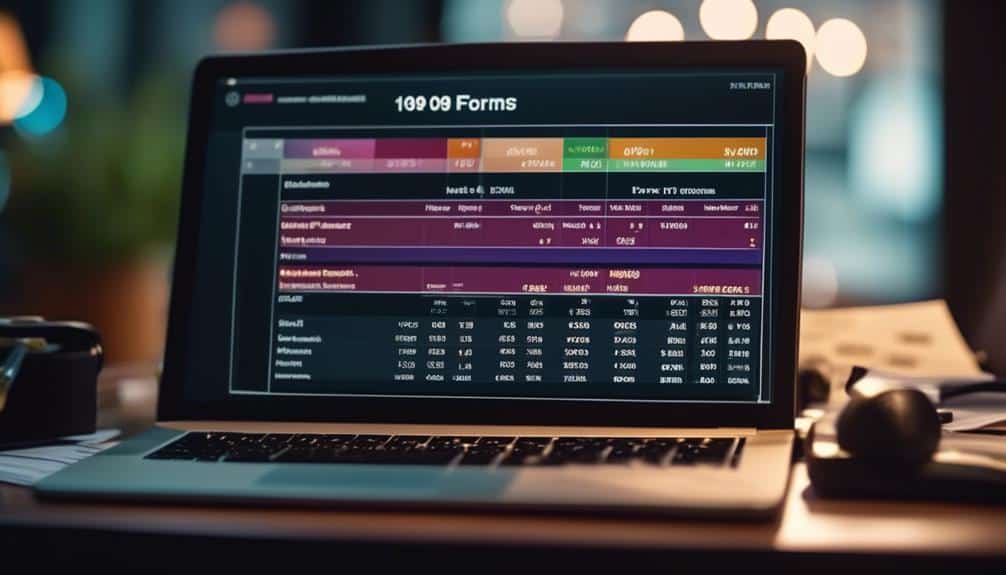Understanding Your Tax Obligations on ClickBank Commissions
Imagine receiving a beautifully wrapped gift for your birthday. The excitement mounts as you untie the ribbon and open the box, only to find a note inside that states, 'Don't forget about taxes.'
Just like that unexpected reminder, navigating your tax obligations on ClickBank commissions can sometimes feel like a surprise waiting to be unwrapped. As you venture into the world of earning online through affiliate marketing, understanding how taxes play into your earnings is crucial.
Let's explore the nuances of tax responsibilities when it comes to your ClickBank commissions, shedding light on what lies beneath the surface of your online income.
Key Takeaways
- Tax credits can reduce taxable income for ClickBank affiliates.
- Differentiating between gross and net income is crucial for managing taxes effectively.
- Tracking and deducting eligible business expenses can lower overall tax liability.
- Understanding and complying with state tax requirements is essential for ClickBank earnings.
Tax Basics for ClickBank Affiliates

If you're a ClickBank affiliate, it's crucial to understand the tax basics that apply to your earnings. Tax credits can help reduce the tax you owe by decreasing your taxable income, providing a dollar-for-dollar reduction in your tax bill. As a ClickBank affiliate, you may be eligible for various tax credits based on your activities and expenses related to promoting products. It's essential to keep detailed records of your expenses to ensure you can claim all eligible credits and deductions.
Moreover, understanding withholding requirements is vital to avoid potential penalties. ClickBank may be required to withhold taxes from your earnings, depending on various factors such as your tax residency status and the tax laws of the country in which you operate. Familiarize yourself with these requirements to ensure compliance and avoid any unexpected tax liabilities at the end of the year.
Differentiating Between Gross and Net Income
When it comes to your ClickBank commissions, understanding the difference between gross and net income is crucial. Gross income refers to the total amount you earn before deductions, while net income is what remains after expenses are subtracted.
Knowing the distinction between these two can significantly impact how you manage your taxes as a ClickBank affiliate.
Gross Vs. Net Definition
To understand the distinction between gross and net income, one must recognize that gross income represents total revenue before deductions, while net income reflects the actual profit after expenses have been subtracted.
- Importance of Knowing Gross vs. Net Income:
- Understanding tax implications for ClickBank commissions.
- Proper income calculation for accurate financial planning.
Knowing the difference between gross and net income is crucial for managing your finances effectively. When dealing with ClickBank commissions, grasping this dissimilarity is essential for tax compliance and determining your actual earnings. By comprehending these concepts, you can make informed decisions regarding your income and expenses, ensuring a clearer financial picture and meeting your tax obligations accurately.
Impact on Taxation
Understanding the distinction between gross and net income is fundamental for navigating the tax implications associated with ClickBank commissions, allowing for precise financial planning and compliance with tax obligations. When it comes to taxation, reporting your income accurately is crucial.
Tax implications can vary depending on whether you report your gross income (total earnings before deductions) or your net income (earnings after deductions). In the case of ClickBank commissions, it's essential to understand how these figures impact your tax liability. Gross income may initially seem higher, but deductions play a significant role in reducing your taxable income.
Understanding 1099 Forms From Clickbank

Upon receiving income from ClickBank, you'll be provided with a 1099 form to report your earnings accurately to the IRS. Understanding the Form 1099 requirements and tax filing deadlines is crucial to ensure compliance with the IRS regulations. Here are some key points to consider:
- Form 1099 Requirements:
- ClickBank will issue a Form 1099 to you if your earnings exceed $600 in a calendar year.
- Make sure to review the information on the form for accuracy before filing your taxes.
- Tax Filing Deadlines:
- The deadline to file your taxes and submit the Form 1099 to the IRS is typically April 15th of the following year.
- If you anticipate any delays in receiving your Form 1099 from ClickBank, consider requesting an extension to avoid penalties.
Deductible Expenses for ClickBank Affiliates
When calculating your taxable income as a ClickBank affiliate, it is essential to identify and track deductible business expenses meticulously. By understanding what expenses you can deduct, you can reduce your taxable income, potentially lowering your overall tax liability. Here are some common business expenses that ClickBank affiliates can typically deduct:
| Category | Description | Eligibility |
|---|---|---|
| Advertising | Costs associated with promoting ClickBank products | Eligible if directly related to business |
| Website Expenses | Hosting fees, domain registration, website design costs | Eligible if used for business purposes |
| Software Subscriptions | Tools and software for marketing or analytics | Eligible if necessary for business operations |
| Travel | Business-related travel expenses like conferences | Eligible if directly tied to business activities |
| Office Supplies | Stationery, printer ink, and other office necessities | Eligible if used for business purposes |
State Tax Considerations for ClickBank Earnings

When it comes to your ClickBank earnings, it's essential to consider the various state tax filing requirements that may apply to you. Understanding the tax deductions available for affiliates can help you optimize your tax situation.
Additionally, being aware of sales tax nexus factors can impact how you report and pay taxes on your ClickBank commissions.
State Tax Filing Requirements
Navigating the complex landscape of state tax filing requirements is essential for individuals earning through ClickBank, as each state may have distinct regulations affecting how earnings are taxed.
When considering state tax filing for ClickBank earnings, it's crucial to be aware of the varying state tax rates that may apply to your commissions. Additionally, understanding the specific filing deadlines set by each state is paramount to avoid penalties or interest charges.
Here are two key points to keep in mind:
- State Tax Rates:
Be informed about the state tax rates that could impact your ClickBank earnings.
- Filing Deadlines:
Mark your calendar with the specific state filing deadlines to ensure timely submission of your taxes.
Tax Deductions for Affiliates
For ClickBank affiliates, understanding the tax deductions available at the state level is crucial for maximizing earnings and minimizing tax liabilities. When it comes to state tax considerations for ClickBank earnings, being aware of the tax implications and available deductions can significantly impact your overall financial situation. Below is a table outlining some common tax deductions that may apply to affiliate earnings at the state level:
| Tax Deduction | Description |
|---|---|
| Home Office Expenses | Expenses related to your home office setup |
| Travel Expenses | Costs incurred while traveling for business |
| Advertising Costs | Expenses related to promoting your affiliate products |
Sales Tax Nexus Factors
To manage your ClickBank earnings effectively, it's essential to be mindful of the intricate Sales Tax Nexus Factors that can impact your state tax obligations.
- Tax Nexus Implications
- Understanding how your online presence may create tax obligations in certain states.
- Knowing the thresholds that trigger sales tax nexus based on your ClickBank earnings.
Being aware of these tax nexus implications is crucial in navigating the tax landscape surrounding your affiliate earnings. By staying informed and proactive, you can ensure compliance with state tax laws and avoid any unexpected liabilities.
Tax Planning Strategies for ClickBank Commissions

When managing your ClickBank commissions, it's essential to devise tax planning strategies that align with your financial goals and obligations. Income planning plays a crucial role in structuring your ClickBank earnings to optimize tax savings.
One effective strategy is to spread out your affiliate income over different tax years to potentially lower your overall tax burden. By strategically timing when you receive your commissions, you can control which tax year they're attributed to, thereby managing your taxable income.
Additionally, consider contributing to retirement accounts to reduce your taxable income. By investing a portion of your ClickBank earnings into retirement vehicles like a traditional IRA or 401(k), you can't only save for the future but also benefit from immediate tax savings. These contributions can lower your current taxable income, potentially putting you in a lower tax bracket and reducing the amount of tax you owe on your ClickBank commissions.
Reporting Foreign ClickBank Income
Having optimized your tax planning strategies for ClickBank commissions, the next critical step is ensuring compliance with reporting requirements for any foreign ClickBank income earned.
- Understanding Foreign Income Reporting:
- Ensure to report all foreign ClickBank income received during the tax year accurately to avoid penalties.
- Familiarize yourself with the specific tax implications associated with foreign income to prevent any surprises during tax season.
When it comes to reporting foreign ClickBank income, meticulous record-keeping becomes essential. Keep detailed records of all transactions, conversions, and payments received from ClickBank.
Additionally, stay informed about any tax treaties or agreements between your country and the foreign jurisdiction where ClickBank operates. By staying proactive and knowledgeable about the tax implications of foreign income, you can accurately report your ClickBank earnings and fulfill your tax obligations responsibly.
Handling Tax Audits as a ClickBank Affiliate

Prepare meticulously for potential tax audits as a ClickBank affiliate by maintaining thorough documentation of all income sources and expenses. Navigating audits can be less daunting when armed with organized records. In the event of an audit, the IRS may scrutinize your ClickBank earnings and deductions. Ensure all transactions are accurately recorded, including affiliate commissions and related expenses.
Stay compliant with tax regulations by keeping detailed records of your ClickBank activities. Be ready to provide evidence of income, expenses, and any relevant deductions. Keep copies of all financial documents, such as 1099 forms and receipts, for at least seven years. If faced with an audit, remain transparent and cooperative with the IRS. Seek professional assistance if needed to navigate the audit process smoothly.
Seeking Professional Tax Advice
Consider consulting with a tax professional to navigate the complexities of ClickBank commission tax obligations effectively. Seeking professional guidance can provide you with the expertise needed to ensure compliance and optimize your tax situation. Here are some key reasons why engaging a tax professional is beneficial:
- Understanding Tax Implications: A tax professional can help you comprehend the specific tax implications of your ClickBank commissions, including how they're categorized and taxed based on your unique circumstances.
- Explaining Deductions: Professionals can guide you on potential deductions related to your affiliate marketing activities, maximizing your tax savings and minimizing liabilities.
- Accessing Professional Guidance: By working with a tax expert, you gain access to personalized advice tailored to your situation, helping you make informed decisions and plan strategically for your tax obligations.
Frequently Asked Questions
Can I Deduct the Cost of Purchasing Clickbank Courses or Tools as a Deductible Expense?
You cannot deduct the cost of purchasing ClickBank courses or tools as a deductible expense. Tax implications vary, so consult a tax professional for guidance. ClickBank courses are not typically considered deductible costs for tax purposes.
How Should I Report Clickbank Commissions Earned in Foreign Currencies on My Tax Return?
When reporting ClickBank commissions in foreign currencies on your tax return, ensure accurate currency conversion. Foreign income may have tax implications, so consider consulting a tax professional. Provide detailed records for proper reporting.
Will Clickbank Issue a 1099 Form if I Earn Less Than $600 in Commissions?
If you earn less than $600 in ClickBank commissions, they won't issue a 1099 form. However, you still have tax implications. Threshold limits may exempt a 1099, but reporting requirements remain for small earnings. Be diligent in documenting income.
What Are the Consequences of Not Reporting Clickbank Commissions on My Tax Return?
Not reporting ClickBank commissions on your tax return can lead to serious consequences. Tax implications may include penalties, fines, and potential legal issues. It's crucial to meet reporting requirements to avoid these negative outcomes.
Are There Any Specific Tax Planning Strategies That Are Unique to Clickbank Affiliates Compared to Other Types of Online Income Earners?
When exploring tax planning strategies for ClickBank affiliates, focus on optimizing deductions, understanding commission structures, and analyzing income sources. By delving into these specifics, you can tailor your financial approach for maximum benefit.
Conclusion
In conclusion, understanding your tax obligations as a ClickBank affiliate is crucial for managing your finances effectively.
By differentiating between gross and net income, keeping track of deductible expenses, and staying informed about state tax considerations, you can ensure compliance with tax laws and maximize your earnings.
Remember to seek professional tax advice when needed and implement tax planning strategies to optimize your financial situation.
Stay proactive and organized to navigate tax audits and report foreign income accurately.








